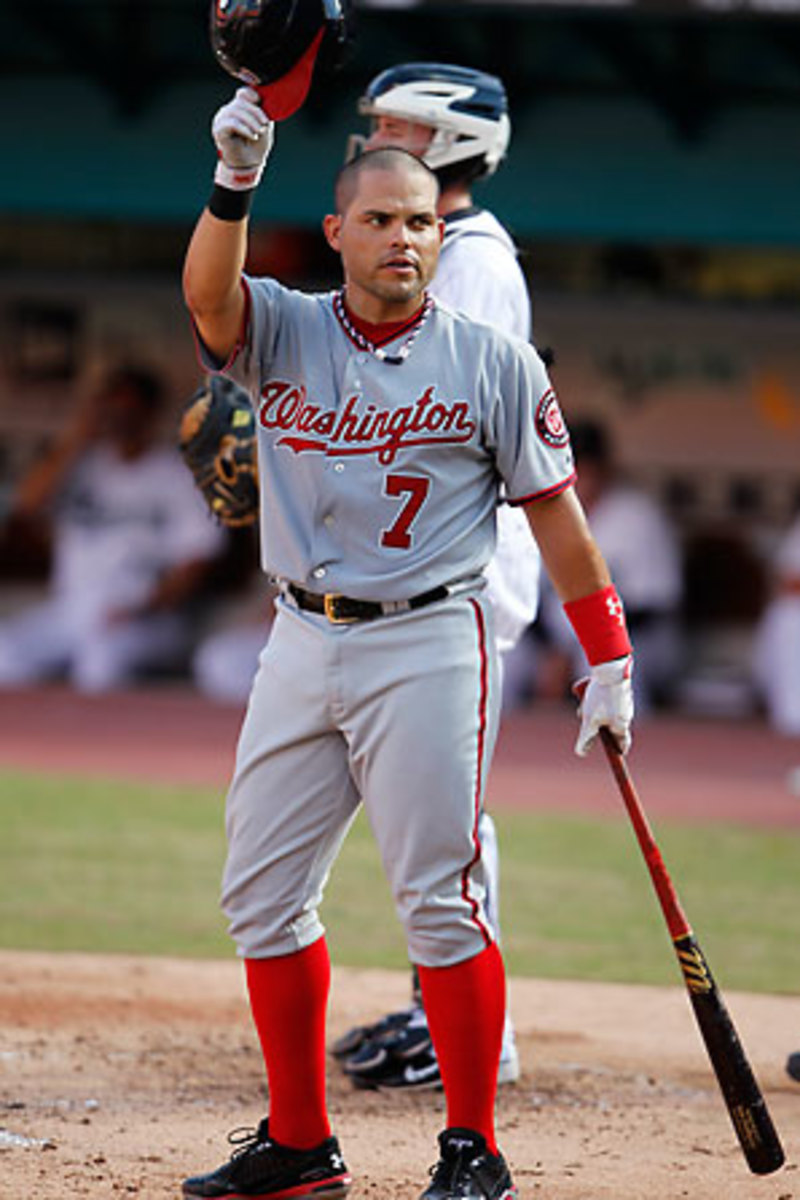For first time in decades, Pudge on outside as spring camps open
Pitchers and catchers have reported to spring training, and for the first time in more than two decades, one of the best backstops in the game's history is not one of them.
Future Hall of Famer Ivan "Pudge" Rodriguez, a veteran of 21 major league seasons, is one of several aging stars (along with Johnny Damon, Vladimir Guerrero and Derrek Lee, among others) still looking for work as the new season gets underway. Like his fellow former All-Stars, Rodriguez knows he's not done yet.
"My situation is kind of hard,'' Rodriguez said recently. "I'm talking from my heart. I have a lot left in my tank. I want teams to know I can help them. I know what I can do, and I want them to know too.''
VERDUCCI: How much do these out-of-work former stars have left?
What Rodriguez wants to do is win another World Series ring -- he got one with the Marlins in 2003 -- and chip away at the 156 hits he needs to reach 3,000 career before he retires.
"Absolutely, I'd love to do both,'' Rodriguez says.
The problem is that, at a time when teams are generally signing younger players, Rodriguez is 40 years old and coming off a season where he spent 11 weeks on the disabled list with an oblique injury. He finished with a .218 average in 44 games for the Washington Nationals.
Rodriguez insists his age is nothing more than a number, and that it's not unreasonable that he could still play, and play well, considering his hard work and excellent conditioning. He's says money is secondary and that he's not looking for a full-time job, although he can catch 80 to 85 games this season.
He even sees his injury as a show of durability. "I had an oblique injury and those injuries take months to heal," he said. "One of the problems was that I tried to come back to soon and a pulled it again. But I am durable and I haven't been on the disabled list much.''
Pudge cringes at the thought of missing so much time last season. A healthy 2011, in which he had just 27 hits, would likely have had him closing in on 3,000 hits this season.
"Tell me about it,'' Rodriguez said. "I tried to come back too early and it cost me.''
Even if he never takes another swing, Rodriguez, considered the best two-way catcher in history, is a sure-fire Hall of Famer. He has made 14 All-Star appearances, won 13 Gold Gloves and the 1999 American League MVP award, and played in two World Series'. He's considered a good leader and articulate teacher who simplifies strategy for young pitchers.
Though not known as a power hitter, Pudge has hit 311 home runs in his career, and his 2,884 hits are second among active players to the Derek Jeter's 3,088.
Asked if he would sign with a non-contending team in exchange for more at-bats and a better chance at 3,000 hits, Rodriguez paused for a long time before answering.
"I don't know,'' he said. "I'd have to think about that.''
Pudge says that ideal situation for him would be to sign with the Miami Marlins. He lives in Miami about 15 minutes from the Marlins' new ballpark.
That may not be so ideal for the Marlins, though. They already have John Buck and Brett Hayes as their catchers, and they haven't shown much interest in Pudge, despite his standing as a local hero, whose arrival in 2003 was a huge factor in transforming them into world champions.
Returning to the Nationals would also be difficult, as Washington has Wilson Ramos installed as their starter and Jesus Flores as their backup.
Another option would be for Rodriguez to sign a minor league contract and be insurance in case a backup goes down, but, he says, "I'd like to think that I wouldn't have to do that."
His offseason has been much like spring training. He and his son, Dereck, an outfielder in the Minnesota Twins' organization, work out together and take batting practice against Pudge's brother, Jose. Pudge lifts weights, runs and hits every day. His workouts last three to four hours.
He runs grueling sprints. On Mondays, he runs four each of 30-, 40-, 50- and 60-meter sprints. On Wednesday, he stretches it to three each of 100- 125- and 150-meter sprints. Then, on Friday, he moves up to 100, 250 and 300 meters.
And, he doesn't want to think about the r-word (retirement) yet. He hopes that isn't an option until he passes 3,000.
"Sometimes, I'm going to have to sit down and ask, 'Should I continue?' But, that time is not yet. If you work hard and take care of yourself, you can still play. I feel great. I'm happy and I know teams can count on me.''






